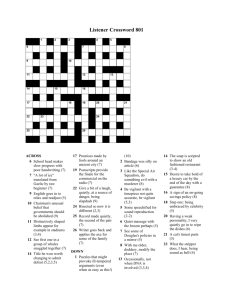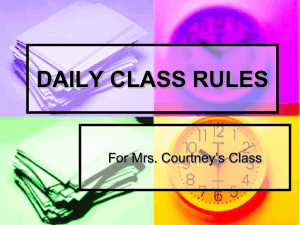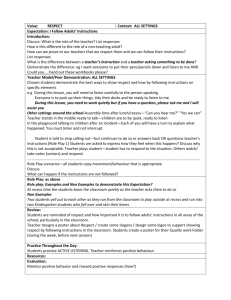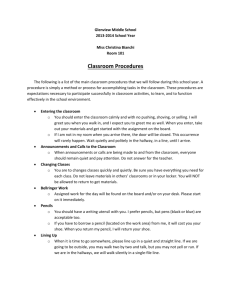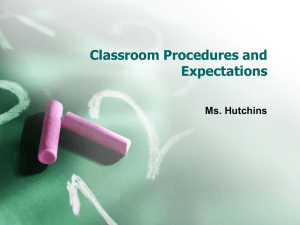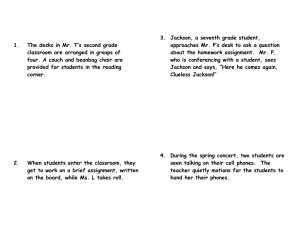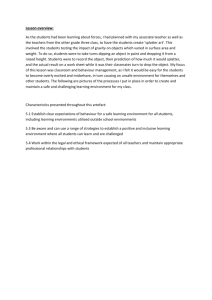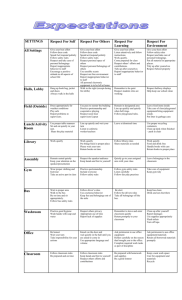Ideas about Improving Classroom Management
advertisement
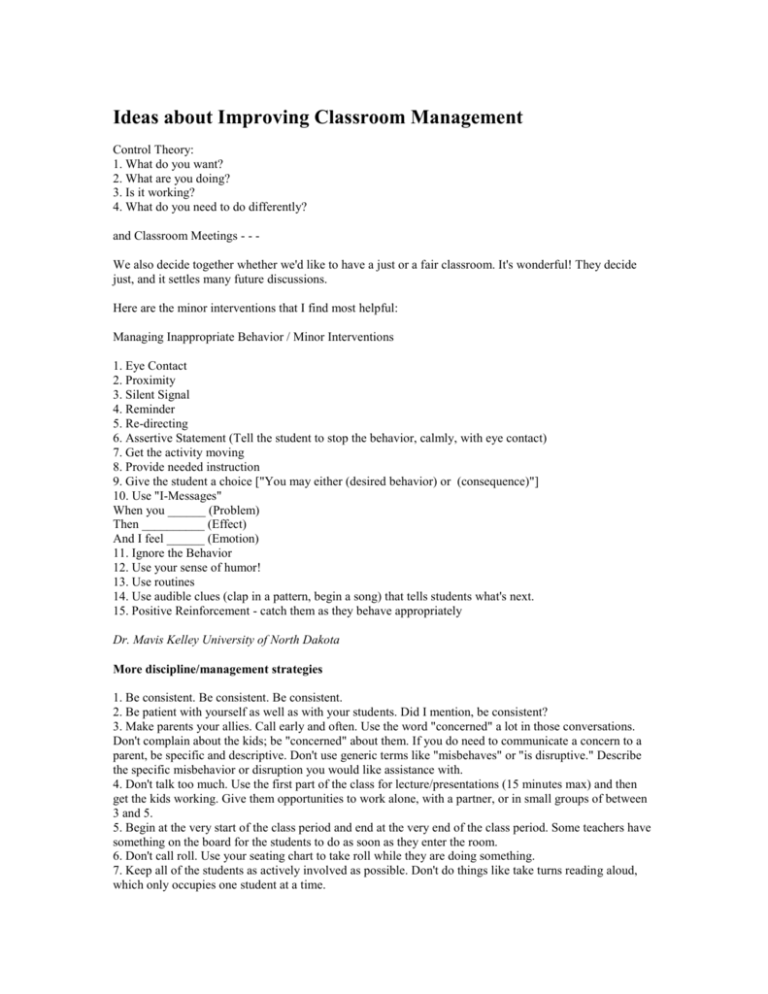
Ideas about Improving Classroom Management Control Theory: 1. What do you want? 2. What are you doing? 3. Is it working? 4. What do you need to do differently? and Classroom Meetings - - We also decide together whether we'd like to have a just or a fair classroom. It's wonderful! They decide just, and it settles many future discussions. Here are the minor interventions that I find most helpful: Managing Inappropriate Behavior / Minor Interventions 1. Eye Contact 2. Proximity 3. Silent Signal 4. Reminder 5. Re-directing 6. Assertive Statement (Tell the student to stop the behavior, calmly, with eye contact) 7. Get the activity moving 8. Provide needed instruction 9. Give the student a choice ["You may either (desired behavior) or (consequence)"] 10. Use "I-Messages" When you ______ (Problem) Then __________ (Effect) And I feel ______ (Emotion) 11. Ignore the Behavior 12. Use your sense of humor! 13. Use routines 14. Use audible clues (clap in a pattern, begin a song) that tells students what's next. 15. Positive Reinforcement - catch them as they behave appropriately Dr. Mavis Kelley University of North Dakota More discipline/management strategies 1. Be consistent. Be consistent. Be consistent. 2. Be patient with yourself as well as with your students. Did I mention, be consistent? 3. Make parents your allies. Call early and often. Use the word "concerned" a lot in those conversations. Don't complain about the kids; be "concerned" about them. If you do need to communicate a concern to a parent, be specific and descriptive. Don't use generic terms like "misbehaves" or "is disruptive." Describe the specific misbehavior or disruption you would like assistance with. 4. Don't talk too much. Use the first part of the class for lecture/presentations (15 minutes max) and then get the kids working. Give them opportunities to work alone, with a partner, or in small groups of between 3 and 5. 5. Begin at the very start of the class period and end at the very end of the class period. Some teachers have something on the board for the students to do as soon as they enter the room. 6. Don't call roll. Use your seating chart to take roll while they are doing something. 7. Keep all of the students as actively involved as possible. Don't do things like take turns reading aloud, which only occupies one student at a time. 8. When one group does a presentation of any kind, the rest of the students should be involved in evaluating that group, preferably with a rubric. 9. If you need to talk to a specific student, then quietly go up to them and talk to them at their desk or out in the hall. Never engage in a disciplinary conversation across the room. It becomes a fascinating game of pingpong for the rest of the class to enjoy. 10. Keep your sense of perspective and your sense of humor. Don't let a student get the upper hand. If a staring contest ensues, be willing to capitulate. Say, "if you want to have a staring contest, I'm happy to give in. I don't care which of us can outstare the other; what I need for you to do is..." 11. Know when to seek help from your English coordinator, counselors, other teachers, administrators, parents, and anyone else who can offer help. You don't have to do it all yourself. Learn this. It is very important. 12. Did I mention, be consistent? Howard Miller Team Expectations 1. Everyone has the right to be treated with respect by everyone else. 2. Everyone has the right and the responsibility to learn. 3. Students will come to class prepared with all necessary books and supplies. 4. Class activities begin immediately as the students enter the classroom. At the end of class time, the teacher is responsible for dismissing the class. 5. Eating and chewing are not allowed in class except when the teacher provides an occasional treat. 6. If you are absent, you must plan to make up your work as quickly as possible. The Number One cause of a poor grade is failing to make up missing assignments. Following these policies will help with the smooth running of your classes and will help you be successful--our primary goal. Howard Miller The seven things students want to know on the first day of school: 1.Is this my English teacher? 2.Which books, notebooks will I need in this lesson? 3.What will I be doing this year? 4.How will I be graded? 5.What are the rules of this teacher? 6.Will the teacher treat me as a human being? 7.Who is the teacher as a person? DEVELOPING CLASSROOM RULES Rules are an essential part of any classroom. Some people object to specifying the rules because they feel that rules are restrictive. These people do not recognise that all of us follow rules in every setting we are in. The rules may not be overtly specified, but that's because there is an assumption that we have learned the rules and will follow them automatically. We don't yell in a theatre. We are generally polite to people. We don't go through red lights when we drive. We don't hit other people when we disagree with them. We follow these rules because we have learned that they provide guidelines to help us function in a complicated society. In the same way, you need to help your students function in a very complicated society - your classroom. Do not assume that students know how to behave in a classroom - regardless of their age. Students in the early primary grades need to learn a tremendous amount about social interactions and how to behave in an academic setting among twenty or more peers. Older students have learned that the range of acceptable behaviour is wide, depending on the teacher in charge. Some teachers let you talk; other don't. Some teachers let you chew gum; others don't. As a result, rules should be designed so that students know exactly what your goals and expectations are, and you should go over the rules soon after the students have entered the classroom. When you're designing your rules, don't go overboard. You don't want to have so many rules that your classroom sounds like a penal colony. Usually four or five well-planned rules can cover your expectations for general classroom behaviour. One tendency is to make rules that begin with the word "don't". "Don't" rules imply that you actually expect students to misbehave. For example, during independent seatwork activities you might state the rules as follows: * Don't talk. * Don't get out of your seat. * Don't bother your neighbour. * Don't be late handing in your work. In the example above, four rules were required to cover independent work. Stated positively, one rule could have the same function: Work quietly and independently at your seat until you have completed your work. If you state a general "at task" rule, any number of misbehaviours are automatically excluded, and many desired behaviours are included. Rules stated as positive expectations provide non threatening, assertive guidelines without making you sound like a dictator. Rules should be tailored to your individual teaching style and to the vocabulary level of your students. Two sample lists follow. The first could be used with primary students; the second with intermediate students. You should modify these rules or design your own to reflect the goals you have established for your students. In other words, students following well-designed rules will be meeting your expectations. Some suggested rules for primary students are as follows: * Always do your best. * Listen when the teacher or someone else is talking. * Raise your hand if you have something to say or to ask. * Get along with your neighbours. * Work quietly at your desk. Some suggested rules for secondary students are listed below: * Give every task your best effort. * Listen when someone is talking. Raise your hand when you have a question or comment. * Co-operate and get along with your peers. * Work quietly and independently at your desk until you have completed your work. Take a few minutes to brainstorm rules for your classroom. Write down as many rules as you can. Combine specific rules to reflect your general expectations. Your final list should consist of four or five comprehensive guidelines for your students to follow. Step five of this section will cover how you should present your rules to the students. To complete rule preparation, decide what the consequences of rule-breaking will be. Will you punish those who misbehave? Will you reinforce the behaviour of students who follow the rules? You should decide how you are going to enforce your rules before the school term begins. MiddleDoc@aol.com
